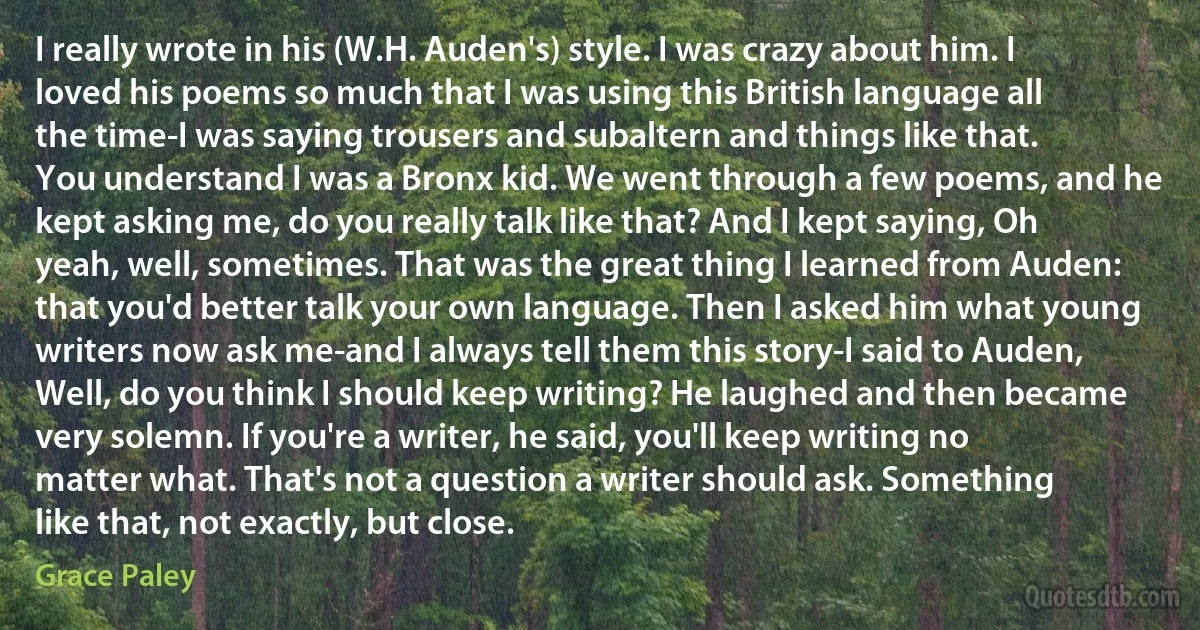
I really wrote in his (W.H. Auden's) style. I was crazy about him. I loved his poems so much that I was using this British language all the time-I was saying trousers and subaltern and things like that. You understand I was a Bronx kid. We went through a few poems, and he kept asking me, do you really talk like that? And I kept saying, Oh yeah, well, sometimes. That was the great thing I learned from Auden: that you'd better talk your own language. Then I asked him what young writers now ask me-and I always tell them this story-I said to Auden, Well, do you think I should keep writing? He laughed and then became very solemn. If you're a writer, he said, you'll keep writing no matter what. That's not a question a writer should ask. Something like that, not exactly, but close.
Grace PaleyRelated topics
asking ask close crazy few went great kid language matter now question say saying should something subaltern talk tell thing think trousers using well young auden things bronx yeahRelated quotes
Words are not deeds. In published poems - we think first of Eliot's "Jew", words edge closer to deeds. In Céline's anti-Semitic textbooks, words get as close to deeds as words can well get. Blood libels scrawled on front doors are deed.
In a correspondence, words are hardly even words. They are soundless cries and whispers, "gouts of bile," as Larkin characterized his political opinions, ways of saying, "Gloomy old sod, aren't I?" Or more simply, "Grrr."
Correspondences are self-dramatizations. Above all, a word in a letter is never your last word on any subject. There was no public side to Larkin's prejudices, and nothing that could be construed as a racist - the word suggest a system of thought, rather than an absence of thought, which would be closer to the reality, closer to the jolts and twitches of self response.

Martin Amis
The critics have no historical sense. I have no Cabinet papers by me and do not want to trust my memory. But recall the Fulham election, the Peace Ballot, Singapore, sanctions, Malta. The English will only learn by example. When I first heard of Hitler, when Ribbentrop came to see me, I thought they were all crazy. I think I brought Ramsay and Simon to meet Ribbentrop. Remember that Ramsay's health was breaking up in the last two years. He had lost his nerve in the House in the last year. I had to take all the important speeches. The moment he went I prepared for a General Election and got a bigger majority for re-armament. No power on earth could have got re-armament without a General Election except by a big split. Simon was inefficient. I had to lead the House and keep the machine together with those Labour fellows.

Stanley Baldwin
Hadiya Pendleton was me and I was her, but I got to grow up and go to Princeton and Harvard Law School and have a career and a family and the most blessed life I could ever imagine. And Hadiya, we know that story. Just a week after she performed at my husband's inauguration, she went to a park with some friends and got shot in the back because some kid thought she was in a gang. Hadiya's family did everything right, but she still didn't have a chance. And that story, the story of Hadiya's life and death, we read that story day after day, month after month, year after year, in this city and around this country. So I'm not talking about something happening in a war zone, halfway around the world. I am talking about what is happening in the city that we call home.

Michelle Obama
If I, so close to the peak, could glean no joy from that rarefied air, the air I was told, as soon as I'd acquired language, would absolve me, if in fact all I gleaned was the view from that peak, the vista true, that the whole climb had been a spellbound clamber up an edifice of foolishness, then what possible salvation can there be for those at the foothills or dying on the slopes or those for whom the climb is not even an option? What is their solution? Well, it's the same solution that's available to me, the only solution that will make any of us free. To detach the harness and fall within. Now that's what I call an extended metaphor. In Fairfield, Iowa, then, there could be the solution. But none of us want a boring solution. The Revolution cannot be boring.

Russell Brand
We alone can be wracked with doubt, and we alone have been provoked by that epistemic itch to seek a remedy: better truth-seeking methods. Wanting to keep better track of our food supplies, our territories, our families, our enemies, we discovered the benefits of talking it over with others, asking questions, passing on lore. We invented culture. Then we invented measuring, and arithmetic, and maps, and writing. These communicative and recording innovations come with a built-in ideal: truth. The point of asking questions is to find true answers; the point of measuring is to measure accurately; the point of making maps is to find your way to your destination. ... In short, the goal of truth goes without saying, in every human culture.

Daniel Dennett
